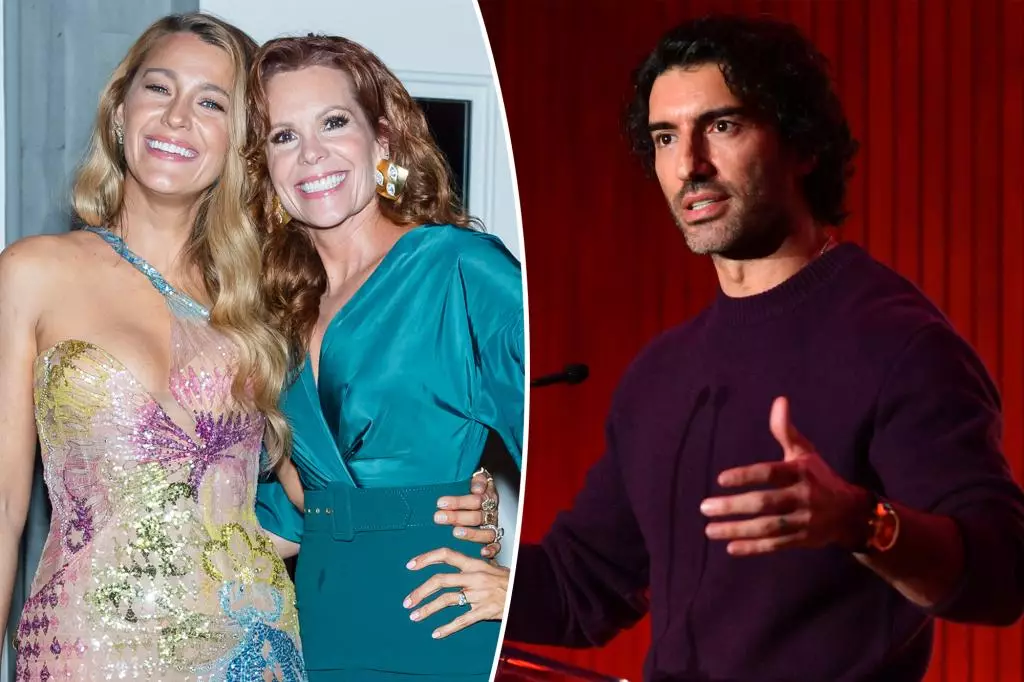In an era where Hollywood is grappling with issues of power dynamics, gender-based violence, and accountability, the recent clash between Blake Lively and Justin Baldoni takes center stage. The controversy escalated when Blake, a prominent figure known for her role in “Gossip Girl,” alleged that Baldoni had engaged in inappropriate conduct during the filming of “It Ends With Us.” Advancing her case, Blake’s sister, Robyn Lively, demonstrated unwavering support through social media, emphasizing the importance of standing up against what she termed as “shameful” behavior. Robyn’s social media posts not only underline familial loyalty but also shine a light on the broader implications of such allegations against high-profile individuals in the entertainment industry.
Support from family, especially during turbulent times, is imperative. Robyn’s Instagram stories, which expressed a call for justice for Blake, reveal the emotional toll of being in the public eye while dealing with personal issues. Robyn shared snippets from an article detailing the alleged smear campaign orchestrated by Baldoni to undermine her sister’s reputation during the film’s promotional phase. Highlighted phrases like, “people really want to hate on women,” resonate powerfully, shedding light on the misogyny still prevalent in various professional arenas, including entertainment.
Blake’s claims against Baldoni are not simply casual accusations; they are part of a serious legal complaint that outlines troubling behavior on set. According to documents acquired by Page Six, Blake initiated an urgent meeting to address Baldoni’s uncomfortable actions, including sharing “nude videos or images of women” and discussing his past with pornography and sexual experiences. The increase in such notable allegations against powerful individuals reflects a significant shift in how society perceives and addresses sexual misconduct.
In advocating for a safer working environment, Blake’s requests for an intimacy coordinator and strict protocols surrounding physical interactions underscore the need for established boundaries in film and television. Notably, stipulations such as the prohibition of “biting or sucking of lips” without consent highlight the pressing issues regarding consent—a topic often glossed over in the industry. Despite the legal implications, what remains at stake is Blake’s mental health and professional reputation, particularly in an industry where women are often subjected to harsh scrutiny.
In response to the allegations, Baldoni’s attorney dismissed the claims as “categorically false” and “outrageous.” This immediate denial conveys a defensive stance—a common tactic employed by those accused of misconduct, aiming to protect personal and professional images. Yet, the fact remains that numerous women voice similar experiences, tying these allegations into a larger conversation about power imbalance and misogyny in Hollywood. This pattern complicates the narrative, as public perception can easily become entangled with celebrity status, often leading to victim-blaming and further emotional harm for the accuser.
The repercussions of this incident extend into the professional realm for both parties. Following Blake’s allegations, Baldoni was dropped by his talent agency, illustrating that the fallout from such allegations can be swift and unforgiving. Meanwhile, Blake continues to receive support and representation by the same agency, highlighting both a clear divide in how allegations are treated based on gender and the importance of protecting those who speak out.
As the situation develops, it speaks volumes about the ongoing necessity for dialogue surrounding consent, accountability, and the protection of individuals in the industry. Robyn’s steadfast support exemplifies the bond that can act as a fortress against public scrutiny, a reminder that behind the glitz and glamour of Hollywood, real lives and real emotions are at stake. With shifting societal attitudes toward sexual misconduct, cases like Blake’s pave the way for others to share their stories, ultimately fostering an environment where justice is not a privilege but a right.
The unfolding narrative surrounding Blake Lively and Justin Baldoni underscores urgent questions about the treatment of women in the industry and the powerful stories that emerge when individuals choose to speak out. As the public watches, it is clear this singular incident may influence future conversations about conduct, support, and the restoration of dignity in professional spaces.

Leave a Reply